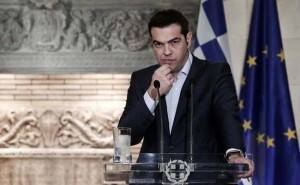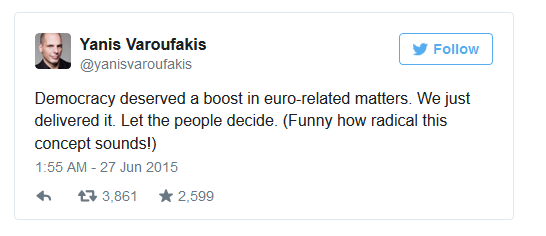Greek Prime Minister Alexis Tsipras called a shock referendum for July 5 on the tough economic policies that the country’s creditors want in exchange for more rescue funding. He addressed the nation at 1 a.m., telling television audiences that Greek voters should choose as to whether the list of policies the creditors presented in Brussels this week should be accepted. This move caused surprises, though Tsipras said he had informed Greek Chancellor Angela Merkel and French President Francois Hollande about his decision whereas there had been statements in the past by the Radical Left Coalition (SYRIZA) that it would call a referendum if reforms diverged greatly from the party’s pre-election pledge.
Tsipras made this announcement ahead of a critical Eurogroup meeting to take place on Saturday. Greece’s lenders are calling on Greece to implement drastic tax hikes, slash government spending and further cut pensions in a land where austerity has already crippled a major portion of the population. Tsipras, speaking from the prime minister’s residence for about five minutes while looking directly at the camera, said that the people must decide, free of any “blackmail”.
“For the last six months, the Greek government has led the fight to find a viable agreement that respect democracy. We were asked to implement austerity measures allowing the deregulation of the labor market, pension cuts and an increase in VAT on food products targeting the humiliation of an entire people,” he said. “This is a historic responsibility for us to decide on the future of the country. Over the coming days we will have to make decisions on which the lives of future generations will depend.”
Furthermore, he said: “(Our creditors’) proposals, which clearly violate the European rules and the basic rights to work, equality and dignity show that the purpose of some of the partners and institutions was not a viable agreement for all parties, but possibly the humiliation of an entire people… But I personally pledge that I will respect the result of your democratic choice, whatever that may be.”
Following the prime minister’s speech, Greek Finance Minister Yanis Varoufakis tweeted:
SYRIZA’s left platform approved the move. Greece’s Energy Minister Panagiotis Lafazanis said: “If the Greek people say a big No, it is going to be impossible for those who wield power not to take notice unless democracy no longer exists.”
The referendum move is considered a risky strategy. It set off Greeks rushing to withdraw cash from the ATMs in the early hours of the morning with Greece’s Alpha Bank stopping all online transactions according to its website.
Is there still a deal to put to a referendum?
Greece’s creditors from the European Commission, European Central Bank and International Monetary Fund were pushing on Friday for Greece to sign the deal that would enforce a new round of austerity in Greece by the end of the weekend to avert an IMF default on June 30. German Chancellor Angela Merkel urged Athens not to waste an “extraordinarily generous” offer, but Tsipras responded with claims that he would refuse any take-it-or-leave-it offers after a two-day EU leaders’ summit dominated by the crisis.
Following Tsipras’ risky move there may be no deal to discuss at Eurogroup. European Commission Jean-Claude Juncker was reportedly furious when he heard the news of the referendum. Following the announcement for a referendum, an EU official said: “TheGreeks will vote on a deal that is no longer on the table. It’s time for Plan B”.
There is speculation as to whether the referendum means a “yes or no to the euro.”
Ask me anything
Explore related questions






